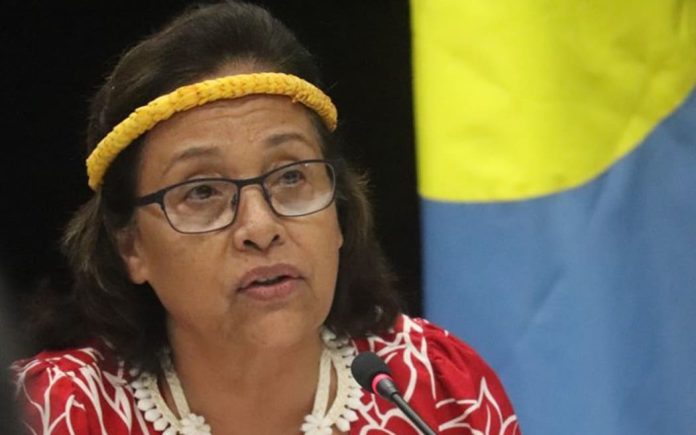The arrest and extradition to the United States last week of two naturalised Marshallese citizens indicted by the Justice Department for allegedly bribing multiple elected leaders here is “a big black eye for the Marshall Islands,” former Marshall Islands President Hilda Heine told the Nitijela (parliament).
“What is the Marshall Islands government going to do about the officials who accepted bribes?” asked the former president, who was the target of an unsuccessful vote of no confidence in parliament when her government in 2018 refused to support the establishment of a “special administrative region” for Rongelap Atoll, known as RASAR.
“What is the Nitijela and the government going to do about this big black eye for Marshall Islands?”
Former Health Minister Kalani Kaneko, now an opposition member, urged the government to work with the FBI to investigate the bribe allegations involving Marshall Islands political leaders outlined by the U.S Justice Department in its indictment of naturalised Marshallese citizens Cary Yan and Gina Zhou.
The indictment, originally filed in late 2020, was unsealed this past Friday in the Southern District Court of New York to coincide with Yan and Zhou’s arrival from Thailand under escort by US Marshals.
They were detained by Thai authorities in late 2020 at the request of the U.S Justice Department and held until the extradition was carried out last Friday. They are charged with violating the U.S Foreign Corrupt Practices Act for allegedly bribing elected leaders and engaging in money laundering “designed to influence and manipulate the legislative process” in the Marshall Islands, said Damian Williams, the U.S Attorney for the Southern District of New York, where Yan and Zhou have been charged. They will make their first appearance in court on Tuesday this week.
Yan and a group of Marshall Islands elected leaders were backing a plan to establish RASAR (Rongelap Atoll Special Administrative Region) that was touted as a way to attract foreign investment to the Marshall Islands and specifically Rongelap Atoll, which was exposed to high-level radioactive fallout from the Bravo hydrogen bomb test in 1954, rendering it largely uninhabitable. But President Heine’s administration in 2018 refused to support Yan’s plan because they said it violated the constitution and would undermine the rule of law. RASAR’s backers in parliament responded by initiating a vote of no confidence that came one vote short of unseating Heine.
Some saw the RASAR plan as an entry point for China into a U,S and Taiwan-aligned Pacific nation, part of an ongoing geopolitical battle being played out in the Pacific between the two superpowers. Others said it was to help develop the islands economically.
Kaneko told parliament Monday that the Marshall Islands passports of Yan and Zhou “should be revoked immediately. During President Heine’s administration, we revoked his (Yan’s) passport,” Kaneko told parliament. “How come he has a passport since we revoked it?”
Marshall Islands Attorney General Bernard Adiniwin said by email Monday in reply to questions that “Both of the renewal of their passports applications were approved via a Cabinet Minute dated 30 January, 2020.” This was less than a month after President Heine lost the presidency and the new administration of President David Kabua took office. Many of the MPs supporting Kabua were RASAR supporters.
Government Minister John Silk, in response to criticism of the bribery allegations contained in the Justice Department’s indictment of Yan and Zhou, said they are innocent until proven guilty and deserve a fair trial. He cautioned the parliament to wait for the legal process in the New York court.
Heine said everyone understands that an accused is innocent until proven guilty. “We’re asking for an investigation of the (Marshall Islands) officials in the U.S indictment,” she said “We want to know who they are. We took the oath of office not to benefit personally (from our positions). If they took bribes, they violated their oath.” She said the Marshall Islands “must have standards for its leaders.”
The U.S indictment of Yan and Zhou states five unnamed Marshall Islands “officials” accepted bribes or other financial benefits with the expectation that they would support the RASAR legislation.
Speaker Kenneth Kedi, who represents Rongelap in the parliament and has been a backer of the RASAR plan, said he never took bribes and defended the RASAR proposal as one that was aimed at improving the difficult circumstances of nuclear test-affected islanders who suffer a high rate of cancers and who’ve lost the ability to live on their home islands due to radioactive contamination.
In a separate email communication responding to questions about the U.S indictment of Yan and Zhou, former president Heine said: “I am happy to finally see Cary Yan and his accomplice brought to justice and to see the RASAR saga exposed for what it is: A scheme to get some people rich at the expense of everyone else who calls the Marshall Islands home.”
She called the entire affair with the RASAR plan and the alleged bribes to gain its passage by parliament an “embarrassment.
“This case demonstrates how low some of our leaders are willing to go for their own personal aggrandisement,” she said.
Heine said that her government in the 2016-20 period “chose to follow good governance and the rule of law; others were ready to sell their country for some measly amount of money. What a shame!
We need to take necessary actions to let the public know that the law does not allow public officials to use their offices for personal benefits and that accepting bribes is not ever acceptable behaviour for leaders,” she said.
SOURCE: MARSHALL ISLANDS JOURNAL/RNZ PACIFIC/PACNEWS













